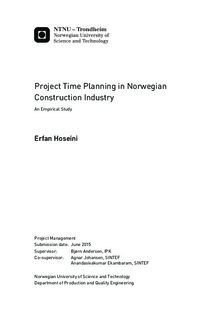Project Time Planning in Norwegian Construction Industry - An Empirical Study
Master thesis
Permanent lenke
http://hdl.handle.net/11250/2351140Utgivelsesdato
2015Metadata
Vis full innførselSamlinger
Sammendrag
Literatures investigation reveal that poor project planning is cited by many authors as a delay factor in the construction projects. Project planning have many different aspects and this research only addresses time aspect of project planning in the Norwegian construction industry. To capture the real word experience of experts in Norwegian construction industry and to find out the factors influencing project time planning, a survey questionnaire was conducted. The survey was distributed among the experts in construction companies, which are in partnership with the SpeedUp project. Totally, 62 complete responses were gathered. Respondents were asked different questions about their background, project time planning personnel, project time planning tools, and the relation between project time planning and project delay. The result shows that more than 90% of the respondents agree that poor project time planning may lead to delay. Almost all of the respondents mentioned poor project management as a reason of poor time planning. Besides, most of the respondents cited more experienced people as the most important enabler of time planning improvement.Based on the literature, a model is presented which shows that poor project time planning has a harsher effect on delay in the execution phase. Moreover, the best phases to improve the project schedule is in the planning phase of the projects. Due to the relationship between delay factors, start of one delay factor may trigger other delay factors as well. This situation can be like a domino where initiation of one of the factors may activate other factors and the final consequence may be project delay. Therefore, to avoid delay, the whole system should be considered and controlling only one of the factors is not sufficient.
